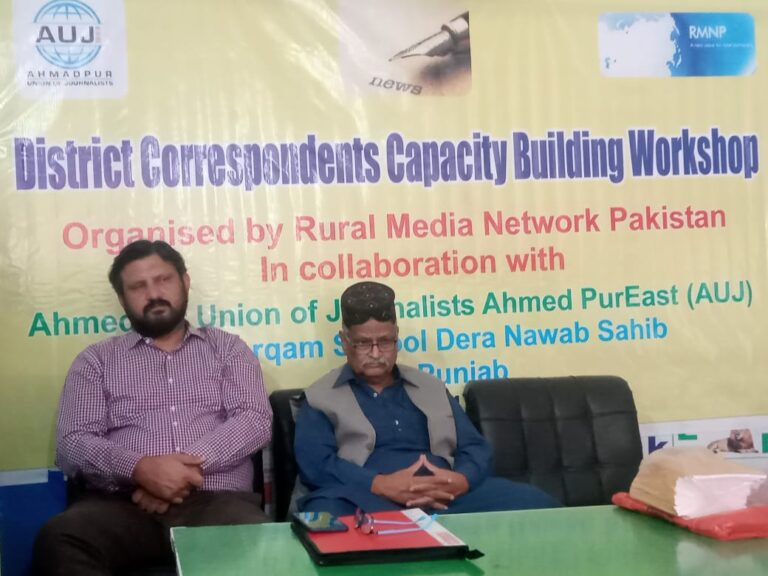366 Basic Journalism Training Manuals Distributed Among Journalists in Rural Areas
(RahimyarKhan) 366 training manuals on the basics of journalism for district correspondents have been distributed among rural journalists, individuals and female contributors of two religious madressas during last one year by the RMNP. Thanks to Commonwealth Journalists Association & Daily Nawa-I-AhmedpurSharqia for their financial support for publishing the second edition of this training manual.
A total of 200 district correspondents benefited from a series of two days capacity-building workshops organized by RMNP and DCMF in remote and rural locations across three districts of South Punjab.Apart from safety trainings, two sessions focused on basic journalism training. The training produced positive feedback from those who participated. Besides imparting basic skills to rural journalists, the workshops also provided a useful forum for the discussion of press freedom and other professional issues and their possible solutions. Participants were provided with training materials in Urdu, as well as editorial tips and information about social, environmental and development issues.
The liberalization of the broadcasting and print sectors in Pakistan over the past two decades has led to an explosion in the media. This growth has produced a parallel rise in the number of district correspondents, most of whom have had no formal training or experience in news reporting, explains RMNP President Ehsan Ahmed Sehar. While newcomers in cities can learn from senior colleagues on the job, correspondents working in rural areas often work without guidance. As a result, news coverage from these areas remains haphazard and of uneven quality, as the majority of rural journalists lack the necessary skills to cover the diverse range of complex issues affecting their communities. Among the topics covered during the training workshops were journalistic techniques, how to cover press conferences, and disaster reporting. The training also aimed to address the issue of press freedom violations in rural Pakistan, by establishing an effective network of journalists to monitor and defend freedom of expression. RMNP had arranged separate resource persons for basic journalism training sessions. One participant in Khanbela workshop, senior correspondent Raza Gillani, related how he broke the news of the arrest of Aimal Kansi, condemned by a US court for his alleged involvement in the killing of alleged spies with the CIA. Raza Gillani told the resource persons that Aimal Kansi had a hideout in Tranda Muhammad Panah where he remained more than five years, using the alias Ismaeel Khan. He further disclosed that Aimal Kansi had written five letters to him from the US jail before his execution.
In their evaluation forms participants lauded the efforts of Commonwealth Journalists Association and RMNP for the provision of basic journalism training manual, which will be instrumental in their daily reporting business. Participants requested that the Commonwealth Journalists Association support the RMNP’s plan for three-day Basic Journalism Training Programmes in future. It is pertinent to mention that earlier a total of 229 district correspondents, including 68 students of the Media Studies Department of the Islamia University of Bahawalpur and 45 women journalists, benefited from a series of three-day capacity-building workshops organized by the Rural Media Network Pakistan (RMNP) in conjunction with UNESCO during August 2011 to June 2012.





